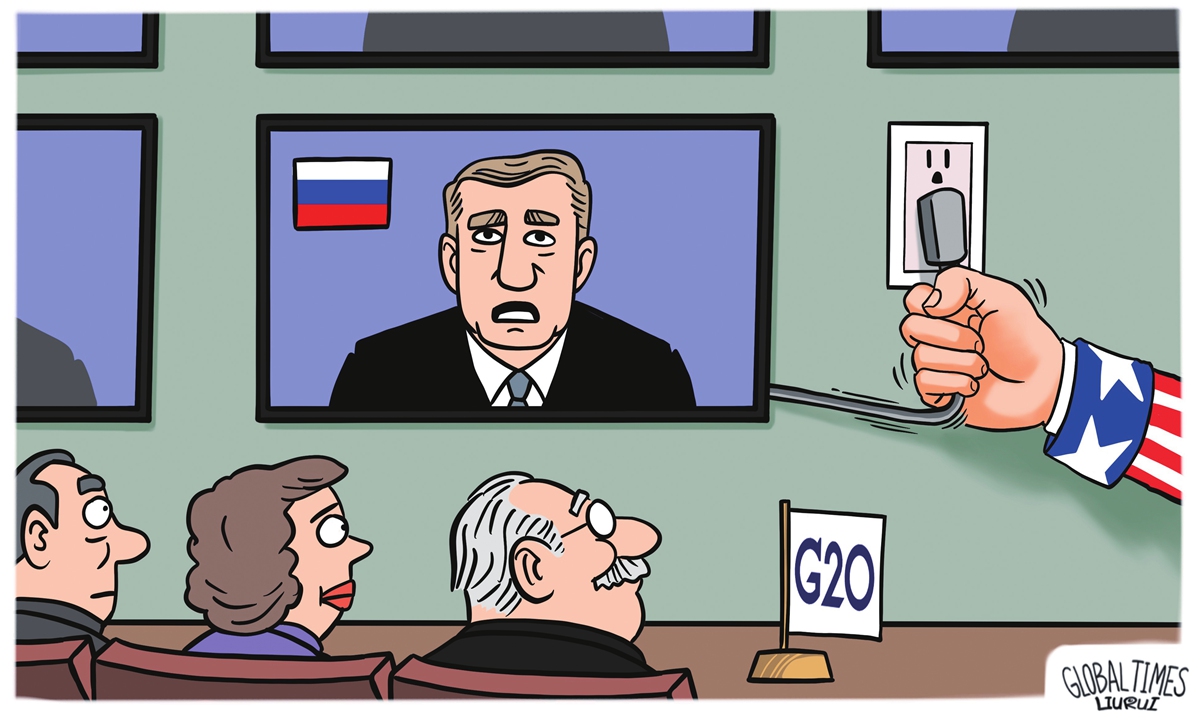
Illustration: Liu Rui/GT
The US and its allies have used every means, ranging from staging a walkout during a meeting of the Group of 20 major economies to launching new financial sanctions, in a bid to increase pressure on Russia, while continuing to throw mud at China despite the latter's repeated announcement of neutrality on the Russia-Ukraine conflict.
Economists interpreted the US action as a tactic to shift its people's attention from rising living costs to "imaginary enemies," that is, Russia and any other country that shows some level of friendliness to Russia. It also reflects the US intention to draw Europe to its side against China in its "Indo-Pacific strategy" by molding China as a "Russian helper," they said.
On Wednesday, US Treasury Secretary Janet Yellen and some from other countries walked out of a G20 Finance Ministers and Central Bank Governors meeting in protest against Russia's military actions.
Russian Deputy Finance Minister Timur Maksimov attended the meeting, while several other officials joined virtually. Chinese Finance Minister Liu Kun also attended the meeting, which was held on Wednesday and Thursday.
When delivering a speech at the meeting, Liu said that China is against politicizing and weaponizing the global economy, and the G20 should stick to its own responsibility by focusing discussions on economic impact while seeking comprehension and balance.
Experts criticized Western countries for "putting on a show" at the G20 meeting and bringing a very bad influence to the G20 system which should be a mechanism to discuss economic issues and seek cooperation.
"The original intention of G20 is to solve crises. But it is now becoming a stage for displaying a Cold War mentality. The US is literally destroying the fundamentals of the G20 mechanism," Dong Shaopeng, an expert advisor for the China Securities Regulatory Commission, told the Global Times on Thursday.
Apart from insulting Russia on global diplomatic occasions, the US also launched a new round of sanctions against the country. On Wednesday, it imposed sanctions on dozens of Russian entities and personnel, including a Russian commercial bank and a virtual currency mining company.
Western countries led by the US have imposed several rounds of sanctions on Russia, including targeting the country's largest lenders, kicking Russia out of dollar payment system SWIFT, and banning imports of certain Russian products.
Chen Jia, a research fellow with the International Monetary Institute of the Renmin University of China, told the Global Times on Thursday that the US is shifting from general sanctions on Russia to more targeted sanctions to hit back against certain methods used by Russia to counteract Western sanctions, such as using virtual currencies to expand the categories and accessibility of Russian trade.
The US also maintained high pressure on China in terms of the Russian issue. US Deputy Secretary of State Wendy Sherman recently said that if China aids Russia, it could face similar sanctions, according to media reports.
Sherman also reportedly spoke of US concerns about "China's support for Russia" in a meeting with NATO representatives on Wednesday.
Behind the US' sanctions is the rising trend of unilateralism and conservatism in the country, experts said, as the country tries to shift people's anger amid domestic stagflation risks toward overseas "enemies," while setting Europe against China so that it could get more support from Europe on the "Indo-Pacific strategy," experts said.
Diao Daming, associate professor at the Renmin University of China in Beijing, told the Global Times on Thursday that since the beginning of the Russia-Ukraine conflict, the US has had two main demands for China - cooperation with the US in imposing sanctions on Russia and cutting off daily trade with Russia - both of which are impossible to achieve.
"While all sides have repeatedly confirmed that China is not providing military assistance to Russia, it makes no sense for the US to request other countries to cut normal trade relations with Russia," Diao said, adding that the US is just trying to tie up China and Russia together to create a vision of the so-called "larger threat."
Dong also said that the US didn't care about what China said or the reality of China's stance on the Ukraine issue. "The US just has one aim about China, which is to damage China's rising position in the world," he said.
Experts stressed that what sets China apart from the US is that the US has been making judgments based on its own selfish interests and hegemony, while China has been choosing its position on the merits and acting with respect for the UN Charter.
"This approach is what guarantees that the world can stay under mutual respect and win-win cooperation, and this status should be the only method to solve the problems we see now in a long-term, effective manner," Diao said.




